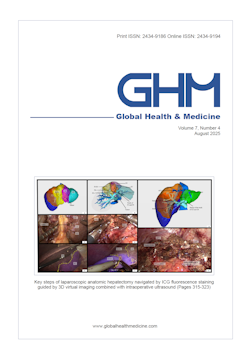Global Health & Medicine 2021;3(6):371-377.
Surgical strategies for treatment of clinical T4 esophageal cancer in Japan
Yamada K, Nohara K, Enomoto N, Wake H, Yagi S, Terayama M, Kato D, Yokoi C, Kojima Y, Nakayama H, Kokudo N
Definitive chemoradiation (dCRT) is the mainstay treatment for cStage IVa esophageal squamous cell carcinoma (ESCC) with good performance status (PS), according to standard practice guidelines. Salvage surgery may incur operation complications and risk of mortality. According to the esophageal cancer practice guidelines outlined by the Japan Esophageal Society, when a tumor is residual and recurrent, chemotherapy and palliative symptomatic treatment is continued. However, salvage operation has been selected as a therapeutic option for recurrent or residual tumors after dCRT. There is weak evidence for not recommending surgery for cStage IVa ESCC exhibiting residual disease following dCRT. It has been reported that during salvage surgery the only prognostic factor that is thought to be performed is complete resection (R0), but at the same time, salvage esophagectomy increases the incidence of postoperative complications and mortality. The phase II chemoselection study by Yokota T et al. in Japan showed that multidisciplinary treatment initiated by induction therapy, in which docetaxel is added to cisplatin and 5-fluorouracil, resulted in a good prognosis in the short term. In this review, we discuss the surgical strategy and future of unresectable clinical T4 (cT4) ESCC.
DOI: 10.35772/ghm.2020.01090







